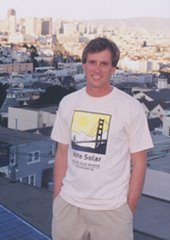Political Will and Solar Power
 Jared Diamond lectured last night at Berkeley's Congregational Church about his book, Collapse. His most interesting comment was an answer to a question. A chap who works for Ecological Footprint asked, “Is there enough time to prevent the collapse of our global civilization? How much time do we have?” Diamond’s answer may have been overly sanguine. There is great danger, he said, but there are lots of favorable signs too. The problems confronting us are of our own making. It’s not as if a giant meteor were headed toward earth. We created this crisis and we can solve it – with sufficient political will.
Jared Diamond lectured last night at Berkeley's Congregational Church about his book, Collapse. His most interesting comment was an answer to a question. A chap who works for Ecological Footprint asked, “Is there enough time to prevent the collapse of our global civilization? How much time do we have?” Diamond’s answer may have been overly sanguine. There is great danger, he said, but there are lots of favorable signs too. The problems confronting us are of our own making. It’s not as if a giant meteor were headed toward earth. We created this crisis and we can solve it – with sufficient political will.That’s an upbeat answer only to people who believe that political will can be stimulated with ease. In many places it does not occur readily — even in Canada, where the polls predict that the next government will be formed by the Conservatives, who say they intend to withdraw from the Kyoto Accords. But here in California, there’s political will aplenty.
Evidence: Today I went to a reception in San Francisco’s City Hall. The master of ceremonies was David Hochschild (see photo), the son of my good friends Arlie and Adam. The festivities were to celebrate a new solar power initiative, adopted only this morning by California’s Public Utilities Commission by a 3-1 margin. The mayor, two of the commissioners, and a business leader spoke, but it was really David’s big day. He and his co-worker, Adam Browning, had developed the scheme and stimulated the public support that enabled it to be adopted. The commission received 50,000 letters of support for it. I call that political will.
The plan will spend $3.2 billion on the development of solar power over the next eleven years. It will generate 3,000 megawatts of power on the equivalent of one million roofs. Never before on earth has there been such a huge project supporting solar energy. Each household will pay about $3 per year more, to support the development – a deal that Republican Governor Arnold Schwarzenegger supports. Moreover, it’s not just Californians who will benefit from the initiative. As Juan, one of David’s friends, explained to me, the price of solar panels is determined by the supply-and-demand relationship. By funding the supply of new solar installations in such large numbers, great economies of scale will result, which in turn will make solar more affordable to ordinary people, creating additional demand, and so on. People in other states and other countries will also benefit from these economies of scale. Solar will catch on everywhere. Today was a tipping point — a moment when the whole economic system just underwent an irreversible change in favor of renewable energy.
Everyone can recognize two of the interdependent effects that this initiative addresses: both the end of oil and also the crisis of global warming. Yet there are even more effects that fewer people understand: namely, a probable impact on democracy and on warfare.
Whenever we’re dealing with a system, there are several different variables involved in complex ways. Whatever influences one variable will affect the others as well. In this case, whatever reduces the world’s dependence on oil will improve the prospects for democracy. This is true because all rentier economies (i.e. those depending on the extraction of raw material such as oil) can be dominated by a small social class that rules the country for their own personal gain. As John Bacher showed in his fine book, Petrotyranny, almost all oil-producing countries are dictatorships, whereas most of the other countries in the world are fully or partly democratic. Moreover, there is a causal relationship between democracy and the reduction of violent conflict both inside and between countries. The spread of democracy around the world has resulted in a decline in the number and severity of wars. Solar power will be distributed across millions of households and businesses. It cannot be controlled, as oil can be, by any single social class within a society. The dispersion of ownership of energy sources will foster democracy, both in California and in all the other countries that benefit from the economies of scale that California will create.
This does not settle the question that Professor Diamond was asked: Is there enough time to prevent the collapse of our civilization? Nobody knows the answer. But here in California tonight I can say this: It’s looking good. Thanks a lot, David Hochschild.



0 Comments:
Post a Comment
<< Home